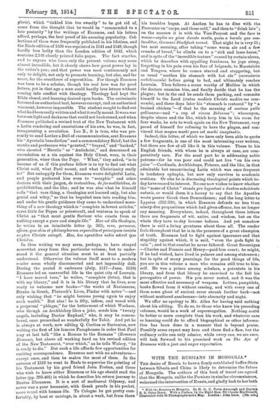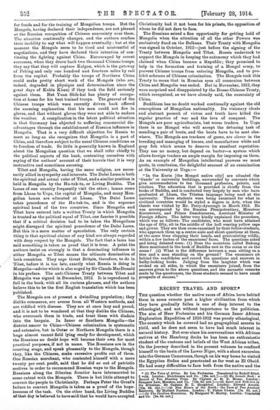WITH THE RUSSIANS IN MONGOLIA" THE desire of Russia to
have a firmly established buffer-State between Siberia and China is likely to determine the future of Mongolia. The authors of this book of travel are agreed that the Mongols, unlike the Persians in similar circumstances, welcomed the intervention of Russia, and gladly look to her both
gh and Captain • With the Eanians Moisectio By H. G
B. B. Otter-Barry. With a ffreface. the EisChtPlrarryn.-BAir'cilds MacDonald: Illustrated with 50 Photographs and a Map. Load°. John Irene. [Me. netij
for funds and for the training of Mongolian troops. But the Mongols, having declared their independence, are not pleased at the Russian recognition of Chinese suzerainty over them. The situation continually changes, and the authors confess their inability to say what will happen eventually ; but at the moment the Mongols seem to be tired and mistrustful of negotiations, and they have declared their intention of con- tinuing the fighting against China. Encoureged by recent successes, when they drove back two thousand Chinese troops, they say that they will capture Kalgan, which is the gateway of Peking and only one hundred and fourteen miles by rail from the capital. Probably the troops of Northern China could make pretty short work of the Mongols (who are, indeed, degraded in physique and determination since the great days of ICubla Khan) if they took the field seriously against them. But Yuan Shih-kai has plenty of occupa- tion at home for his best trained troops. The general of the Chinese troops which were recently driven back offered the amusing explanation that his men could not fire in gloves, and that without gloves they were not able to endure the weather. A complication in the latest political situation is that Germany has objected to suffering commercial dis- advantages through the establishment of Russian influence in Mongolia. That is a very difficult objection for Russia to meet an long as she recognizes that Mongolia is a part of China, and therefore subject to the usual Chinese conditions as to freedom of trade. So little is generally known in England about the Mongolian question that we shall refer chiefly to the political aspects of the book, contenting ourselves with saying of the authors' account of their travels that it is very instructive and sometimes amusing.
Tibet and Mongolia, having the same religion, are neces- sarily allied in sympathy and interests. The Dalai Lama is both the spiritual and actual ruler of Tibet, ands similar position is held in Mongolia by the Hu-tuk-tu, or Living Buddha. The lamas of one country frequently visit the other ; lamas come from Lhasa to Urga, the capital of Mongolia, and many Mon- golian lamas are educated at Lhasa. The Dalai Lama takes precedence of the Hu-tuk-tu, and is the supreme spiritual head of the two countries. Since Mongolia and Tibet have entered into a written Treaty in which Mongolia is treated as the political equal of Tibet, one fancies it possible that if a critical decision had to be taken the Mongolians might disregard the spiritual precedence of the Dalai Lama. But this is a mere matter of speculation. The only certain thing is that spiritual claims of any kind are always regarded with deep respect by the Mongols. The fact that a lama has said something is taken ae proof that it is true. A point the authors insist on strongly is that a dominating influence in ••either Mongolia or Tibet means the ultimate domination of • i both countries. They urge Great Britain, therefore, to do in Tibet, before it is too late, exactly what Russia is doing in Mongolia—advice which is also urged by Sir Claude MacDonald in his preface. The anti-Chinese Treaty between Tibet and Mongolia was signed in December, 1912. It is reproduced in full in the book, with all its curious phrases, and the authors believe this to be the first English translation which has been published.
The Mongols are at present a dwindling population; they dislike commerce, are averse from all Western methods, and are riddled with disease. They are at once lazy and proud, and it is not to be wondered at that they dislike the Chinese, who overreach them in trade, and treat them with disdain into the bargain. In Inner or Southern Mongolia—the district nearer to China—Chinese colonization is systematic and extensive, but in Outer or Northern Mongolia there is a huge almost vacant field lying ready for development, which the Russians no doubt hope will become their own for most Practical purposes, if not in name. The Russians are in the courting stage, and speak pleasantly to the Mongols, though they, like the Chinese, make excessive profits out of them. One Russian merchant, who contented himself with a mere twenty per cent. profit, said that he did so out of patriotic motives in order to recommend Russian ways to the Mongols. Russians along the Siberian frontier have intermarried to some extent with the Mongols. There is but little attempt to convert the people to Christianity. Perhaps Peter the Great's failure to convert Mongolia is taken as a proof of the hope- lessness of the task. On the other hand, the Living Buddha of that day is believed to have said that he would have accepted Christianity had it not been for his priests, the opposition of whom he did not dare to face.
The Russians seized a fine opportunity for getting hold of Mongolia when the attention of all the other Powers was exclusively fixed on the Balkans. Their Treaty with Mongolia was signed in October, 1912—just before the signing of the Treaty between Mongolia and Tibet. Russia undertook to support the Mongols in keeping the autonomy which they had claimed when China became a Republic; they promised to help in the formation and training of a Mongol army, to prevent Chinese troops from entering Mongolia, and to pro- hibit schemes of Chinese colonization. The Mongols took this Treaty to mean that in Russian eyes all connexion between China and Mongolia was ended. But in November, 1913, they were surprised and disappointed by the Russo-Chinese Treaty, which recognized, as we have already said, the suzerainty of China.
Buddhism has no doubt worked continually against the old conceptions of Mongolian nationality. Its visionary ideals and abstract pursuit of virtue and truth have killed the regular practice of war and the love of conquest. The Mongols are poor agriculturists, but worse traders. In Urga there is no Mongol who will accept the debasing task of mending a pair of boots, and the boots have to be eent else- where. The Mongols are trackere of game, are clever in the breeding and managing of horses, and manufacture white and grey felt which seems to deserve its excellent reputation. They use no money, but depend on barter—a system which allows foreign traders an ample margin for imposing on them. As an example of Mongolian intellectual prowess we must quote, in conclusion, the delightful account of an examination at the University at Urga :—
"In the Kurth. [the Mongol native city] are situated the .Gando' or university buildings, surrounded by convents which give accommodation to ten thousand professors, priests, and scholars. The education that is provided is chiefly from the books of Buddha, and is conducted very largely by men who have graduated at Lhasa, the Tibetan language being used at the university. Three students were being examined for what in civilized countries would be styled a degree in Arts, when the Gando was visited by Mr. Perry-Ayscough in March 1913. He was accompanied by the Russian Plenipotentiary, Monsieur Korostovetz, and Prince Damdinsurun, Assistant Minister of Foreign Affairs. The latter very kindly explained the procedure, which was as follows: The candidates, who must have attained the age of fifty, sit in the middle of the hall wearing yellow caps and gowns. They are then cross-examined by their fellow-students, who approach them up a centre aisle and shout questions at them, at the same time clapping their hands, and gesticulating wildly, within a few inches of the examinees faces. The questions asked and being debated were: (1) Does the mountain called Bnkung Burn mentioned in the book of Buddha rest in the ocean or on the ocean ? (2) What is the difference between a man sitting on a tree and a man standing on the ground ? The examiners sit behind the candidates and record the questions and answers in bulky-looking books. Judging from the laughter which was evoked on all sides, in which the examiners joined, from the answers given to the above questions, and the sarcastio remarks made by the questioners, the three students seemed to have small prospects of success."















































 Previous page
Previous page